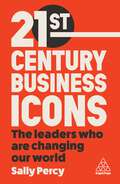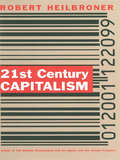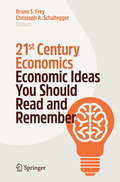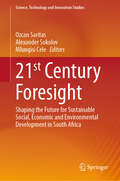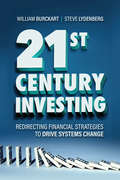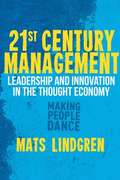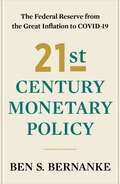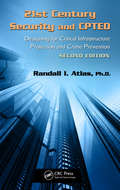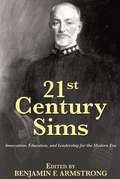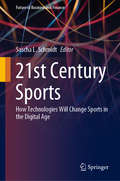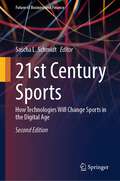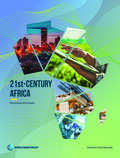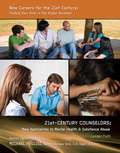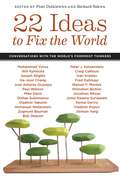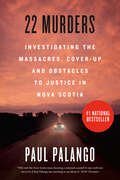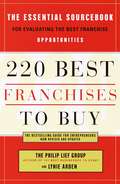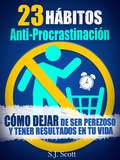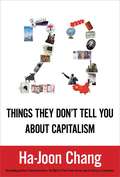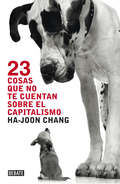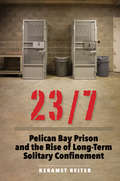- Table View
- List View
21st Century Business Icons: The Leaders Who Are Changing our World
by Sally PercyFrom the stratospheric success of Jeff Bezos to the secret genius of Satoshi Nakamoto, 21st Century Business Icons uncovers the fascinating success stories behind some of the world's most innovative business leaders.Behind every success is the unique story of an individual who has transformed their ambition into reality. They have overcome their competition through innovation, determination and confidence. This book uncovers the stories behind these figures - while they may be divisive, controversial or polarizing - each of them offers fascinating insights into business and society.Stretching from California to Tokyo and covering sectors such as tech, retail, banking and social media, this book uncovers the secrets behind success on a global scale. Discover how Whitney Wolfe Herd reinvented the dating industry and how Jimmy Donaldson built a YouTube business empire. 21st Century Business Icons is a fascinating exploration of the entrepreneurs, influencers and pioneers who have redefined the 21st century.
21st Century Capitalism
by Robert L. Heilbroner"It is my hope that some grasp of what the twenty-first century holds in store for capitalism may enable us to avoid at least some of the pain we might otherwise have to endure," writes the eminent economist Robert Heilbroner in this important book on the world's economic future. Although communism lies shattered almost everywhere it once existed, no single form of capitalism has emerged worldwide. Which of the varieties of capitalism will be hardy enough to survive into the next century? Will the private sector make way for government to redress the failures of the market system? Does the defeat of the socialist vision portend that unbridled acquisitiveness will dominate the world? In tackling these questions, Heilbroner takes us to the roots of capitalist society. He views capitalism from a wide angle as both an economic system and a political order, showing the integral connections between the two that are often overlooked; finally, he addresses the overarching challenge ahead--a society that no longer believes in the inevitability of progress.
21st Century Economics: Economic Ideas You Should Read and Remember
by Bruno S. Frey Christoph A. SchalteggerEconomics is a science that can contribute substantial powerful and fresh insights! This book collects essays by leading academics that evaluate the scholarly importance of contemporary economic ideas and concepts, thus providing valuable knowledge about the present state of economics and its progress. This compilation of short essays helps readers interested in economics to identify 21st century economic ideas that should be read and remembered. The authors state their personal opinion on what matters most in contemporary economics and reveal its fascinating and creative sides.
21st Century Foresight: Shaping the Future for Sustainable Social, Economic and Environmental Development in South Africa (Science, Technology and Innovation Studies)
by Alexander Sokolov Ozcan Saritas Mlungisi CeleUsing a new methodology for foresight studies, this book presents new findings and policy recommendations to improve living conditions and make progress toward achieving the Sustainable Development Goals (SDGs). Using the case of South Africa, the respective chapters show how social and economic challenges can be addressed in an inclusive and sustainable way. The book also provides guidelines for practitioners by introducing them to cutting-edge ways of formulating Science, Technology, and Innovation (STI) policies. The new foresight methodology uses a combination of qualitative and quantitative methods, including horizon scanning and scenario planning, as well as big data analysis, scientometric and semantic methods. The innovative approaches developed throughout the book are subsequently demonstrated using a national foresight study in South Africa. The outputs and outcomes generated by the study can be used to inform the identification and selection of priorities for the next decadal plan for STI. The book offers a valuable asset for emerging and developing economies in Africa and around the world in terms of tackling the grand challenges of the 21st century, such as water, food, energy, climate change, health and education.
21st Century Investing: Redirecting Financial Strategies to Drive Systems Change
by William Burckart Steven LydenbergTwo experienced and visionary authors show how institutions and individuals can go beyond conventional and sustainable investing to address complex problems such as income inequality and climate change on a deep, systemic level.It's time for a new way to think about investing, one that can contend with the complex challenges we face in the 21st century. Investment today has evolved from the basic, conventional approach of the 1950s. Investors have since recognized the importance of sustainable investment and have begun considering environmental and social factors. Yet the complexity of the times forces us to recognize and transition to a third stage of investment practice: system-level investing.In this paradigm-shifting book, William Burckart and Steve Lydenberg show how system-level investors support and enhance the health and stability of the social, financial, and environmental systems on which they depend for long-term returns. They preserve and strengthen these fundamental systems while still generating competitive or otherwise acceptable performance.This book is for those investors who believe in that transition. They may be institutions, large or small, concerned about the long-term stability of the environment and society. They may be individual investors who want their children and grandchildren to inherit a just and sustainable world. Whoever they may be, Burckart and Lydenberg show them the what, why, and how of system-level investment in this book: what it means to manage system-level risks and rewards, why it is imperative to do so now, and how to integrate this new way of thinking into their current practice.
21st Century Management
by Mats LindgrenExplores the changing business landscape of the 21st century and what it means for organizations. The author presents a new model for how to think about and handle the complex world of business from a managerial and innovative perspective with tips and tools for motivating and engaging your organization, clients and customers.
21st Century Monetary Policy: The Federal Reserve From The Great Inflation To Covid-19
by Ben S. Bernanke21st Century Monetary Policy takes readers inside the Federal Reserve, explaining what it does and why. In response to the COVID-19 pandemic, the Federal Reserve deployed an extraordinary range of policy tools that helped prevent the collapse of the financial system and the U.S. economy. Chair Jerome Powell and his colleagues lent directly to U.S. businesses, purchased trillions of dollars of government securities, pumped dollars into the international financial system, and crafted a new framework for monetary policy that emphasized job creation. These strategies would have astonished Powell’s late-20th-century predecessors, from William McChesney Martin to Alan Greenspan, and the advent of these tools raises new questions about the future landscape of economic policy. In 21st Century Monetary Policy, Ben S. Bernanke—former chair of the Federal Reserve and one of the world’s leading economists—explains the Fed’s evolution and speculates on its future. Taking a fresh look at the bank’s policymaking over the past seventy years, including his own time as chair, Bernanke shows how changes in the economy have driven the Fed’s innovations. He also lays out new challenges confronting the Fed, including the return of inflation, cryptocurrencies, increased risks of financial instability, and threats to its independence. Beyond explaining the central bank’s new policymaking tools, Bernanke also captures the drama of moments when so much hung on the Fed’s decisions, as well as the personalities and philosophies of those who led the institution.
21st Century Security and CPTED: Designing for Critical Infrastructure Protection and Crime Prevention, Second Edition
by Randall I. AtlasThe concept of Crime Prevention Through Environmental Design (CPTED) has undergone dramatic changes over the last several decades since C. Ray Jeffery coined the term in the early 1970s, and Tim Crowe wrote the first CPTED applications book. The second edition of 21st Century Security and CPTED includes the latest theory, knowledge, and practice of
21st Century Sims
by Edited by Benjamin F. ArmstrongFor more than two decades at the beginning of the 20th century William S. Sims was at the forefront of naval affairs. From the revolution in naval gunnery that he led as a junior officer, to his advocacy for the Dreadnaught style all-big-gun battleship, to his development of torpedo boat and destroyer operations, he was a central figure in helping to prepare the U. S. Navy for World War I. During the war he served as the senior naval commander in Europe and was instrumental in the establishment of the convoy system that won the Battle of the Atlantic. Following the war his leadership as President of the Naval War College established the foundations of the creative and innovative Navy that would develop the operating concepts for submarines and aircraft carriers which would lead to success in World War II. Despite his dramatic impact on the U. S. Navy in the first half of the 20th century, Sims is a relatively unknown figure today. Overshadowed in our memory by the World War II generation of strategic Admirals, like Chester Nimitz and Raymond Spruance, he receives little attention from historians or professional naval officers. Despite the fact that he won a Pulitzer Prize for history, hardly anyone reads the books or articles he left as his legacy. This collection of six essays written by Sims illustrates why his thinking and leadership are relevant to the challenges faced in the 21st century. From the perils of military conservatism, to the responsibilities of the professional officer, to military downsizing and reform, he helped lay the foundations of the modern Navy. Armstrong’s introductions and analysis of these essays links them directly to the issues of innovation, professional education, and leadership that are as important at the start of this century as they were at the start of the last.
21st Century Sports: How Technologies Will Change Sports in the Digital Age (Future of Business and Finance)
by Sascha L. SchmidtThis book outlines the effects that technology-induced change will have on sport within the next five to ten years, and provides food for thought concerning what lies further ahead. Presented as a collection of essays, the authors are leading academics from renowned institutions such as Massachusetts Institute of Technology, Queensland University of Technology, and the University of Cambridge, and practitioners with extensive technological expertise. In their essays, the authors examine the impacts of emerging technologies like artificial intelligence, the Internet of Things, and robotics on sports and assess how they will change sport itself, consumer behavior, and existing business models. The book will help athletes, entrepreneurs, and innovators working in the sports industry to spot trendsetting technologies, gain deeper insights into how they will affect their activities, and identify the most effective responses to stay ahead of the competition both on and off the pitch.
21st Century Sports: How Technologies Will Change Sports in the Digital Age (Future of Business and Finance)
by Sascha L. SchmidtDiscover the exciting future of sports in the digital age with "21st Century Sports: How Technologies Will Change Sports in the Digital Age." This thought-provoking book, now in its second edition, delves into the transformative power of technology on the world of sports within the next five to ten years and beyond. Written by esteemed academics from prestigious institutions like the Massachusetts Institute of Technology, Queensland University of Technology, and the University of Cambridge, alongside seasoned practitioners with extensive technological expertise, this collection of essays offers profound insights. Through their comprehensive analysis, the authors explore the profound impacts of emerging technologies such as artificial intelligence, the Internet of Things, blockchain, web3 and robotics on sports. Uncover how these technologies will revolutionize not only the nature of sports itself but also consumer behavior and existing business models. Athletes, entrepreneurs, and innovators working in the sports and other industries will find invaluable guidance to identify trendsetting technologies, gain deeper insights into their implications, and stay ahead of the competition, both on and off the field. In this new edition, a special focus is given to technology convergence, featuring chapters on the future of fandom, sports in the third connected age and in new digital worlds like the Metaverse. This book is your gateway to the dynamic world where technology and sports intersect, offering a compelling vision of what lies ahead.
21st-Century Africa: Governance and Growth
by Chorching GohWill the 21st century witness Africa’s major push toward catching up with other world regions? Or will the continent continue to underperform its peers? A flagship report published by the World Bank in 2000 asked, Can Africa Claim the 21st Century? It provided a blueprint for Africa to navigate in the uncertain future. A quarter century later, Africa’s progress reveals some advancements, yet efforts to overcome pivotal challenges identified at the century’s outset have fallen short. The agenda to mitigate conflicts, invest in people, bolster economic competitiveness, and reduce dependence on external financing remains unfinished. What will it take to reshape Africa’s trajectory, not only for the few countries that have made notable advancements but also for current and future generations across the continent? The goal of fostering inclusive green growth remains, yet its attainment is increasingly daunting. Based on labor-intensive, polluting industrialization that once brought wealth elsewhere, the growth model is unlikely to succeed as automation expands, trade patterns shift, and climate pressures mount. Amid rapid population growth, achieving social and economic inclusion becomes more arduous. Moreover, sustainability confronts threats not solely from pollution and resource overextraction but also from the exacerbating impacts of the changing climate. Nevertheless, promising instances and hopeful examples in numerous African nations demonstrate that no inherent barriers are preventing Africa from accelerating development and narrowing the gaps with other world regions. To achieve this, countries must intensify efforts to address three crucial enablers of development: 1. Governance with accountable leadership and a competent and committed state. Without this, progress on any aspect of development is unattainable. 2. Young Africans equipped with skills, technology, and access to quality health care, enabling them to engage in society and the economy. 3. Robust, well-functioning market systems that cultivate growth, foster opportunities, and generate productive employment. This sequel report, 21st-Century Africa, analyzes past achievements, enduring obstacles, and potential policy alternatives and outlines strategies for governments to enhance support for sustainable growth. The report delves into ways the continent can empower its expansive, young labor force with the requisite skills and resources for a modern, productive economy. It also explores how trade in goods and services can distribute economic gains across what historically has been the most fragmented world region.
21st-Century Counselors: New Approaches to Mental Health & Substance Abuse
by Camden FlathMany people around the country deal with problems of mental illness and substance abuse, as well as trouble with finding work, communicating with family members, or being bullied at school. The demand for counselors and psychologists who can give support to individuals dealing with these issues and their families is on the rise. The young adults of today will be the job force of tomorrow, so choosing a career that will best fit with the needs of the changing world will be important to job satisfaction and a successful life. With the vast array of career and job options, it will also be important for young adults to understand which work will be the best match for their interests, talents, goals, and personality types. Certain careers are expected to gain importance within the early decades of the twenty-first century. According to the United States Bureau of Labor Statistics, employment in counseling is expected to grow faster than the average rate for all occupations. As attitudes change about mental health, addiction, and emotional well-being, particularly in the level of open discussion surrounding these topics, more people are turning to counselors and psychologists for assistance. Are you ready to help?
22 Ideas to Fix the World: Conversations with the World's Foremost Thinkers
by Richard Sakwa Piotr DutkiewiczThe aftershocks of the 2008 financial crisis still reverberate throughout the globe. Markets are down, unemployment is up, and nations from Greece to Ireland find their very infrastructure on the brink of collapse. There is also a crisis in the management of global affairs, with the institutions of global governance challenged as never before, accompanied by conflicts ranging from Syria, to Iran, to Mali. Domestically, the bases for democratic legitimacy, social sustainability, and environmental adaptability are also changing. In this unique volume from the World Public Forum Dialogue of Civilizations and the Social Science Research Council, some of the world’s greatest minds—from Nobel Prize winners to long-time activists—explore what the prolonged instability of the so-called Great Recession means for our traditional understanding of how governments can and should function. Through interviews that are sure to spark lively debate, 22 Ideas to Fix the World presents both analysis of past geopolitical events and possible solutions and predictions for the future. The book surveys issues relevant to the U.S., Europe, Asia, Africa, and the Middle East. Speaking from a variety of perspectives, including economic, social, developmental, and political, the discussions here increase our understanding of what’s wrong with the world and how to get it right. Interviewees explore topics like the Arab Spring, the influence of international financial organizations, the possibilities for the growth of democracy, the acceleration of global warming, and how to develop enforceable standards for market and social regulation. These inspiring exchanges from some of our most sophisticated thinkers on world policy are honest, brief, and easily understood, presenting thought-provoking ideas in a clear and accessible manner that cuts through the academic jargon that too often obscures more than it reveals. 22 Ideas to Fix the World is living history in the finest sense—a lasting chronicle of the state of the global community today. Interviews with: Zygmunt Bauman, Shimshon Bichler & Jonathan Nitzan, Craig Calhoun, Ha-Joon Chang, Fred Dallmayr, Mike Davis, Bob Deacon, Kemal Dervis, Jiemian Yang, Peter J. Katzenstein, Ivan Krastev, Will Kymlicka, Manuel F. Montes, José Antonio Ocampo, Vladimir Popov, Jospeh Stiglitz, Olzhas Suleimenov, Jomo Kwame Sundaram, Immanuel Wallerstein, Paul Watson, Vladimir Yakunin, Muhammad Yunus
22 Murders: Investigating the Massacres, Cover-up and Obstacles to Justice in Nova Scotia
by Paul PalangoA shocking exposé of the deadliest killing spree in Canadian history, and how police tragically failed its victims and survivors.As news broke of a killer rampaging across the tiny community of Portapique, Nova Scotia, late on April 18, 2020, details were oddly hard to come by. Who was the killer? Why was he not apprehended? What were police doing? How many were dead? And why was the gunman still on the loose the next morning and killing again? The RCMP was largely silent then, and continued to obscure the actions of denturist Gabriel Wortman after an officer shot and killed him at a gas station during a chance encounter. Though retired as an investigative journalist and author, Paul Palango spent much of his career reporting on Canada&’s troubled national police force. Watching the RCMP stumble through the Portapique massacre, only a few hours from his Nova Scotia home, Palango knew the story behind the headlines was more complicated and damning than anyone was willing to admit. With the COVID-19 lockdown sealing off the Maritimes, no journalist in the province knew the RCMP better than Palango did. Within a month, he was back in print and on the radio, peeling away the layers of this murderous episode as only he could, and unearthing the collision of failure and malfeasance that cost a quiet community 22 innocent lives.
22 Murders: Investigating the Massacres, Cover-up and Obstacles to Justice in Nova Scotia
by Paul Palango#1 NATIONAL BESTSELLERA shocking exposé of the deadliest killing spree in Canadian history, and how police tragically failed its victims and survivors.As news broke of a killer rampaging across the tiny community of Portapique, Nova Scotia, late on April 18, 2020, details were oddly hard to come by. Who was the killer? Why was he not apprehended? What were police doing? How many were dead? And why was the gunman still on the loose the next morning and killing again? The RCMP was largely silent then, and continued to obscure the actions of denturist Gabriel Wortman after an officer shot and killed him at a gas station during a chance encounter.Though retired as an investigative journalist and author, Paul Palango spent much of his career reporting on Canada&’s troubled national police force. Watching the RCMP stumble through the Portapique massacre, only a few hours from his Nova Scotia home, Palango knew the story behind the headlines was more complicated and damning than anyone was willing to admit. With the COVID-19 lockdown sealing off the Maritimes, no journalist in the province knew the RCMP better than Palango did. Within a month, he was back in print and on the radio, peeling away the layers of this murderous episode as only he could, and unearthing the collision of failure and malfeasance that cost a quiet community 22 innocent lives.
220 Best Franchises to Buy: The Essential Sourcebook for Evaluating the Best Franchise Opportunities
by Lynie ArdenToday's economic climate, dominated by corporate giants and chains, can be a tough place for a new face, but buying a franchise is the best opportunity for a budding entrepreneur. 220 Best Franchises to Buy, revised and updated with all-new franchise ideas, shows you how to get in on the ground floor--and how to reap the benefits of running your own business without running all the risks. Here are all the facts you need to make an informed decision about the franchise operation that best suits your professional goals, financial resources, and personal needs. The book features a step-by-step breakdown of potentially confusing areas such as financial responsibilities and licensing fees. You'll also learn about what kind of training and marketing to expect for your money, and how to negotiate a contract in your favor. This new edition of a business classic has been completely updated and revised to include franchise opportunities for the new millennium--everything from advertising to the fastest-growing chains of health clubs. With over fifty thousand copies in print,220 Best Franchises to Buyis one of the most trusted sources of franchise information for today's entrepreneurs.
23 Abitudini Per Non Procrastinare
by Eugenia Franzoni S. J. Scott"23 abitudini per non procrastinare: Come smettere di essere pigri e arrivare a dei risultati nella vita" è la guida definitiva per riuscire a portare avanti i vostri progetti e per essere più produttivi. La verità è che a tutti piace fare le cose e diventare produttivi, ma quello che spesso accade è che lasciamo da parte i compiti importanti e che ce li perdiamo senza accorgercene. Il risultato? Siamo sopraffatti dalla quantità di cose da fare. In altre parole, "procrastinare" ci causa dello stress se non completiamo i nostri compiti in modo sistematico. La soluzione è semplice: sviluppare uno stato mentale che eviti il procrastinare, in cui si agisce di giorno in giorno e che ci permetta di non essere MAI sopraffatti dalle cose da fare. Nel libro "23 abitudini per non procrastinare" scoprirete un elenco di idee per aiutarvi a superare ogni giorno la tentazione di procrastinare. Anche se molti libri danno un semplice elenco di suggerimenti, con questo imparerete perché una strategia specifica funziona, quali concetti limitanti elimina e come può essere applicata immediatamente alla vostra vita. In breve, imparerete le cause fondamentali per cui procrastinate, e come superarle. Non c'è bisogno di essere controllati dal procrastinare; lo si può superare formandosi una serie di abitudini positive che ci spingono ad agire.
23 Hábitos Anti-Procrastinación Cómo Dejar De Ser Perezoso Y Tener Resultados En Tu Vida.
by Marcela Gutiérrez Bravo S. J. Scott23 Hábitos Anti-Procrastinación: Cómo dejar de ser perezoso y tener resultados en tu vida es la útlima guía para hacer las cosas y ser más productivo.La verdad es que nos gustaría hacer todo y ser más productivos. Pero lo que sucede continuamente es que posponemos tareas importantes y las dejamos que se escurran por las endiduras. ¿El resultado final? Nos agobiamos por la cantidad de cosas por hacer. En otras palabras, "la procrastinación" te causa que te sientas estresado cuando no has completado taeas de una manera sistemática.La solución es simple. Desarrolla una "mentalidad anti-procrastinación" en el que emprendas de manera diaria y NUNCA te agobies por tu lista de pendientes.En el libro 23 Hábitos Anti-Procrastinación. Descubrirás un catálogo de ideas que te ayudarán a vencer la procrastinación de manera diaria. Mientras muchos libros proveen una simple lista de tips.Aprenderás por qué una estrategia específica funciona. qué creencia limitante la elimina y cómo puede ser inmediatamente aplicada a tu vida. En breve, aprenderás las causas clave de tu procrastinación y acabarás con ellas.No tienes que ser controlado por la procrastinación. Puedes vencerla formando una colección de hábitos positivos que te llevan a emprender.
23 Things They Don't Tell You About Capitalism
by Ha-Joon ChangOne of the world's most respected economists and author of the international bestseller "Bad Samaritans" equips readers with an understanding of how global capitalism works--and doesn't.
23 cosas que no te cuentan sobre el capitalismo
by Ha-Joon Chang¿Cómo no vimos venir el colapso económico en que nos hallamos? Ha-Joon Chang, uno de los economistas más respetados del mundo, tiene la respuesta: no preguntamos qué era lo que no nos contaban sobre el capitalismo. Este es un libro ameno con una intención muy seria, cuestionar las premisas que sostienen el dogma y la propaganda que la escuela dominante de economistas neoliberales -los apóstoles del libre mercado- ha lanzado desde los tiempos de Reagan. 23 cosas que no te cuentan sobre el capitalismo cambiará la manera en que ves todos los tópicos sobre la economía. Ha-Joon Chang hace añicos los principales mitos del mundo en que vivimos y explica cómo funciona realmente el sistema, por ejemplo: -No hay mercados libres. -La globalización no está haciendo más rico el mundo. -La lavadora ha cambiado más el mundo que internet. -En los países pobres hay más iniciativa empresarial que en los ricos. -Los directivos mejor pagados no consiguen mejores resultados Chang, premiado autor de varios libros, es uno de los economistas más respetados del mundo, una voz de cordura e inteligencia en la tradición de John Kenneth Galbraith y Joseph Stiglitz. 23 cosas que no te cuentan sobre el capitalismo permite entender cómo funciona el capitalismo global... y cómo no lo hace. En "Cómo reconstruir la economía mundial", la conclusión final, Chang explica cómo podemos modelar el capitalismo para humanizarlo, en vez de convertirnos en esclavos del mercado. Reseñas:«Una magistral refutación de algunos mitos del capitalismo. Ingenioso, heterodoxo y lleno de sentido común, este libro es imprescindible.»Observer «Importante y convincente. Una clara argumentación en defensa de una etapa más cauta y preocupada por la gente.»Financial Times «Chang, profesor de Economía en Cambridge, resulta inteligente y apasionado sin necesidad de subir los decibelios.»Time «Chang ofrece un iluminador resumen del pensamiento económico moderno, y de todos los casos en que no ha funcionado, animándonos a actuar para reconstruir por completo la economía mundial.»Publishers Weekly «Un libro esencial para todos los que quieran entender el capitalismo no como lo cuentan los economistas o los políticos, sino tal cómo funciona en realidad.»John Gray «Un libro entretenido, accesible y provocador.»Sunday Times
23/7: Pelican Bay Prison and the Rise of Long-Term Solitary Confinement
by Keramet ReiterHow America’s prisons turned a “brutal and inhumane” practice into standard procedure Originally meant to be brief and exceptional, solitary confinement in U.S. prisons has become long-term and common. Prisoners spend twenty-three hours a day in featureless cells, with no visitors or human contact for years on end, and they are held entirely at administrators’ discretion. Keramet Reiter tells the history of one “supermax,” California’s Pelican Bay State Prison, whose extreme conditions recently sparked a statewide hunger strike by 30,000 prisoners. This book describes how Pelican Bay was created without legislative oversight, in fearful response to 1970s radicals; how easily prisoners slip into solitary; and the mental havoc and social costs of years and decades in isolation. The product of fifteen years of research in and about prisons, this book provides essential background to a subject now drawing national attention.
23andMe: Genetic Testing For Consumers (A)
by John A. Quelch Margaret RodriguezOn November 22, 2013, the direct-to-consumer genetic testing provider, 23andMe, received a letter from the U.S. Food and Drug Administration (FDA) ordering the company to halt the sale and promotion of its genetic testing kit. The FDA stated that the product was marketed as a diagnostic and preventative tool and that it was subject to the agency's regulations for medical devices. Company co-founder Anne Wojcicki and chairman Andy Page carefully considered the potential impact of the FDA's letter on 23andMe's position in the industry and the sustainability of its operations.
23andMe: Genetic Testing For Consumers (A)
by John A. Quelch Margaret RodriguezOn November 22, 2013, the direct-to-consumer genetic testing provider, 23andMe, received a letter from the U.S. Food and Drug Administration (FDA) ordering the company to halt the sale and promotion of its genetic testing kit. The FDA stated that the product was marketed as a diagnostic and preventative tool and that it was subject to the agency's regulations for medical devices. Company co-founder Anne Wojcicki and chairman Andy Page carefully considered the potential impact of the FDA's letter on 23andMe's position in the industry and the sustainability of its operations.
23andMe: Genetic Testing for Consumers (B)
by John A. Quelch Margaret RodriguezFollowing the FDA's letter in November 2013, which ordered 23andMe to cease sales of its DNA test kits, observers wondered how co-founder and CEO, Anne Wojcicki, would guide the company in the presence of uncertainty.
